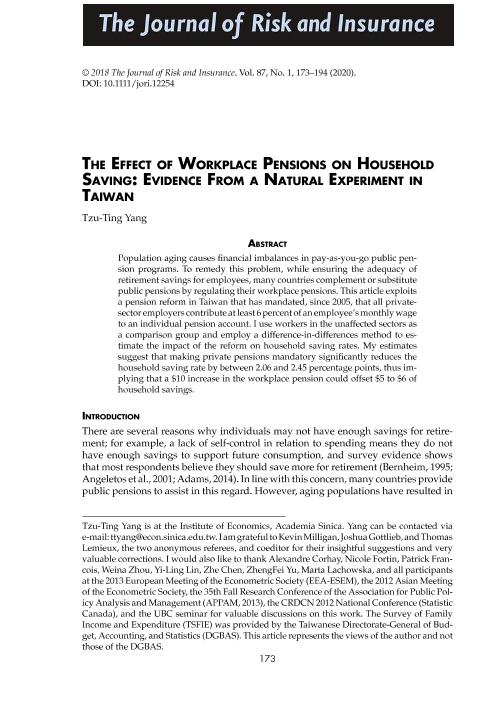The Effect of workplace pensions on household saving : evidence from a natural experiment in Taiwan

Contenido multimedia no disponible por derechos de autor o por acceso restringido. Contacte con la institución para más información.
| Tag | 1 | 2 | Value |
|---|---|---|---|
| LDR | 00000cab a2200000 4500 | ||
| 001 | MAP20200009375 | ||
| 003 | MAP | ||
| 005 | 20200323163712.0 | ||
| 008 | 200323e20200302usa|||p |0|||b|eng d | ||
| 040 | $aMAP$bspa$dMAP | ||
| 084 | $a345 | ||
| 100 | $0MAPA20200006077$aYang, Tzu-Ting | ||
| 245 | 1 | 4 | $aThe Effect of workplace pensions on household saving$b: evidence from a natural experiment in Taiwan$cTzu-Ting Yang |
| 520 | 3 | $aPopulation aging causes financial imbalances in pay-as-you-go public pension programs. To remedy this problem, while ensuring the adequacy of retirement savings for employees, many countries complement or substitute public pensions by regulating their workplace pensions. This article exploits a pension reform in Taiwan that has mandated, since 2005, that all privatesector employers contribute at least 6 percent of an employee's monthly wage to an individual pension account. I use workers in the unaffected sectors as a comparison group and employ a difference-in-differences method to estimate the impact of the reform on household saving rates. My estimates suggest that making private pensions mandatory significantly reduces the household saving rate by between 2.06 and 2.45 percentage points, thus implying that a $10 increase in the workplace pension could offset $5 to $6 of household savings | |
| 650 | 4 | $0MAPA20080552114$aPensiones | |
| 650 | 4 | $0MAPA20080618896$aAhorro financiero familiar | |
| 650 | 4 | $0MAPA20080625597$aEnvejecimiento de la población | |
| 650 | 4 | $0MAPA20080625979$aPlanes de pensiones de empresa | |
| 650 | 4 | $0MAPA20080579258$aCálculo actuarial | |
| 650 | 4 | $0MAPA20080604004$aSistemas de pensiones | |
| 651 | 1 | $0MAPA20120019256$aTaiwan | |
| 773 | 0 | $wMAP20077000727$tThe Journal of risk and insurance$dNueva York : The American Risk and Insurance Association, 1964-$x0022-4367$g02/03/2020 Volumen 87 Número 1 - marzo 2020 , p. 173-194 |

